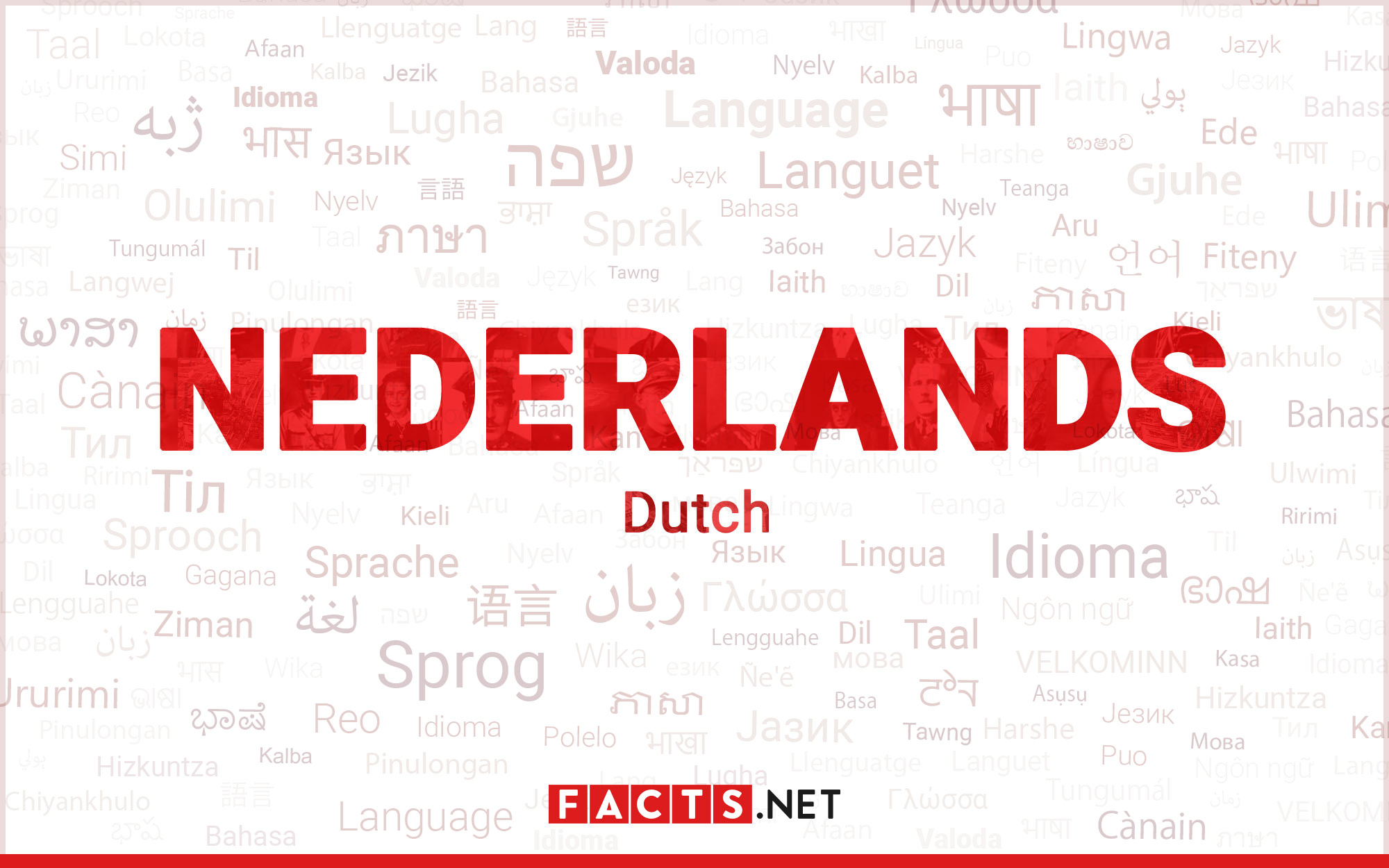
The Dutch language is an intriguing subject that holds many surprising facts and features. As one of the West Germanic languages, Dutch is spoken by millions of people around the world, primarily in the Netherlands and Belgium. Beyond its widespread usage, there are several fascinating aspects to take note of when delving into the world of Dutch.
In this article, we will explore 13 unbelievable facts about the Dutch language that will not only leave you amazed but also provide insight into its rich history, unique characteristics, and notable contributions to society. From its influence on English to its distinct sounds and expressions, Dutch is a language that possesses both beauty and complexity. So, brace yourself as we embark on a journey to unravel the secrets and surprises of the Dutch language.
Key Takeaways:
- Dutch is a unique language spoken by 24 million people worldwide, with a rich history and influence on other languages, making it a fascinating subject to explore.
- The Dutch language is known for its compound words, regional dialects, and role in diplomacy, making it a diverse and important language in the global landscape.
Dutch is one of the official languages of the Netherlands.
Dutch is spoken by approximately 24 million people worldwide, making it one of the official languages of the Netherlands. It is also widely spoken in Belgium and Suriname, as well as by Dutch communities in other countries.
The Dutch language has a rich history.
The Dutch language has its roots in Old Frankish, which was spoken in the area that is now the Netherlands and parts of Belgium. It evolved from Middle Dutch to Modern Dutch over the centuries, influenced by various factors such as trade, colonization, and the arts.
Dutch has similarities to other Germanic languages.
Dutch is part of the West Germanic branch of the Germanic language family, which also includes English, German, and several other languages. It shares similarities in vocabulary, grammar, and pronunciation with these languages.
Dutch has a unique pronunciation system.
The Dutch language has a distinct sound system characterized by guttural sounds, diphthongs, and a rolling “r” sound. The pronunciation can be challenging for non-native speakers, but it adds to the charm and uniqueness of the language.
Dutch has a large vocabulary.
The Dutch language boasts an extensive vocabulary, with a wide range of words for various concepts and situations. It has borrowed words from other languages, particularly French and English, adding to its linguistic diversity.
Dutch has influenced other languages.
Due to its historical significance and trade relations, Dutch has left its mark on other languages. For example, Afrikaans, one of the official languages of South Africa, is derived from Dutch and shares many similarities in vocabulary and structure.
Dutch has its own unique expressions.
Like any language, Dutch has its own set of idioms and expressions that might seem unusual to non-native speakers. These expressions reflect the culture and history of the Dutch people and add color to the language.
Dutch is known for its compound words.
Dutch is famous for its creation of compound words by combining multiple words together. This allows for the expression of complex ideas in a concise manner and showcases the linguistic creativity of the Dutch language.
Dutch has a strong literary tradition.
Throughout history, Dutch literature has produced renowned authors and poets, making a significant contribution to the world of literature. Works by writers such as Anne Frank, Harry Mulisch, and Cees Nooteboom have gained international recognition.
Dutch is a language of science.
Many scientific publications and research papers in various fields are written in Dutch. The language has a rich scientific vocabulary and is used by Dutch universities and research institutions to communicate academic findings.
Dutch is taught as a foreign language.
Due to its global importance and the interest in Dutch culture, the language is taught as a foreign language in many educational institutions worldwide. Dutch language courses are available for students who wish to learn and explore this fascinating language.
Dutch has regional dialects.
Just like any other language, Dutch has regional dialects across different regions in the Netherlands and Belgium. These dialects often have their own unique vocabulary, pronunciation, and grammar patterns, showcasing the linguistic diversity within the Dutch language.
Dutch is a language of diplomacy.
The Netherlands has a long-standing tradition of diplomacy, and the Dutch language plays a crucial role in international relations. Many diplomatic discussions and negotiations are conducted in Dutch, making it an important language in the diplomatic arena.
Conclusion
Dutch is a fascinating language with a rich history and unique characteristics. From its roots in Germanic languages to its influence on English, there are countless interesting facts to explore. Whether it’s the intriguing pronunciation, the widespread use of bicycles, or the abundance of dialects, Dutch is a language that never fails to captivate.
Learning about the Netherlands and its language can provide valuable insights into Dutch culture, traditions, and way of life. Whether you’re planning a trip to Amsterdam or simply expanding your linguistic knowledge, delving into the world of Dutch is a rewarding experience.
So, the next time you hear someone speaking Dutch or come across Dutch words in your travels, remember these 13 unbelievable facts and appreciate the depth and beauty of this unique language.
Start exploring Dutch today and uncover even more astonishing facts about this fascinating language!
FAQs
Q: Is Dutch difficult to learn?
A: Like any language, learning Dutch can be a challenge, especially if you’re not familiar with Germanic languages. However, with dedication and practice, it is definitely attainable.
Q: Are there any similarities between Dutch and English?
A: Yes, there are several similarities between Dutch and English due to their shared Germanic roots. You may notice similar vocabulary and grammar structures, making it easier for English speakers to learn Dutch.
Q: How many people speak Dutch?
A: Dutch is spoken by approximately 23 million people worldwide. It is the official language of the Netherlands, Belgium, Suriname, and several Dutch Caribbean islands.
Q: Are there different dialects of Dutch?
A: Yes, there are several dialects of Dutch spoken across the Netherlands and Belgium. These dialects vary in pronunciation and vocabulary, adding to the linguistic diversity of the Dutch language.
Q: Can I use Dutch in other countries besides the Netherlands?
A: Yes, Dutch is also spoken in Belgium, Suriname, and the Dutch Caribbean islands. It can be a valuable language to know if you plan to visit or work in any of these regions.
Uncover more fascinating insights into Dutch culture and language by exploring our captivating articles. Immerse yourself in the beauty and symbolism of tulips, an iconic emblem of the Netherlands, and learn how these vibrant flowers have become intertwined with Dutch identity. For animal lovers, delve into the world of Dutch Shepherds, loyal and intelligent companions that have played a significant role in shaping the country's history and traditions. Whether you're a language enthusiast, nature admirer, or simply curious about the rich tapestry of Dutch heritage, our articles offer a wealth of knowledge waiting to be discovered.
Was this page helpful?
Our commitment to delivering trustworthy and engaging content is at the heart of what we do. Each fact on our site is contributed by real users like you, bringing a wealth of diverse insights and information. To ensure the highest standards of accuracy and reliability, our dedicated editors meticulously review each submission. This process guarantees that the facts we share are not only fascinating but also credible. Trust in our commitment to quality and authenticity as you explore and learn with us.


